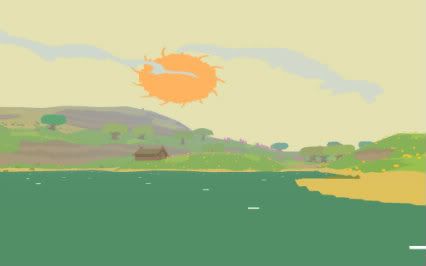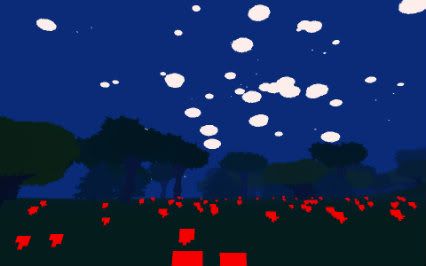
A first-person game in which the player explores a landscape is not an especially original idea in itself. Those who have played The Elder Scrolls series, the first-person Fallout reboot, or the S.T.A.L.K.E.R. games will know well the joys of going on an exploratory ramble. Yet in all these games danger also has a constant presence. You may enjoy the tattered scrubland of The Zone but you also have to think about health, ammunition, horrible things trying to kill you and, importantly, your mission objectives. But what if you didn’t have any of these distractions? What if it were just you and the landscape? That game would be Proteus.
I’m hesitant to call Proteus a game about exploration because in many ways exploration has, in my mind at least, connotations of survival and discovery. Throughout history exploration has generally been an exercise in gaining resources; often entailing an element of danger or the unknown (whether due to jungles, the high seas or fire-spewing ants). Proteus has nothing to say about resource hunting or dangerous, unfamiliar environments; you don’t prepare for the adventure in any way and Proteus’ landscape will be familiar to any of those who’ve ever wandered through the countryside. But this isn’t to say the game is uninteresting because if this game isn’t about exploration, then it’s something far more unique. It’s possibly the first game to be entirely about landscape. By stripping away the complex mechanics of survival and narrative, it is Proteus’ landscape which acts as the single most important subject of the player’s experience.

The game begins with the player ‘waking up’ on a glistening sea and stepping forth onto an island. Visually the island’s landscape is striking in that it uses heavily pixelated and textureless graphics to depict a detailed, beautiful and very dynamic environment. Though trees are square-shaped pink blobs they still sway and rustle in the wind, and despite the lack of texture watching rain clouds forming off the sea and rolling over the land is still utterly breathtaking.
The music and sound design is equally impressive. Termed a ‘reactive ambient soundtrack’ and composed by David Kanaga, Proteus’ soundtrack, which often takes on a soft ambient tone, adapts and changes to the player’s location and immediate environment. Walking up to the snowy peak of a mountain might cause the sound to turn even sparser with a windblown quietness related to the pure white of the snow cap; in a sunny meadow the music gets lighter, more relaxed.
Similarly the few animals which you will encounter have specific sounds which play as you move towards them. Approaching a valley I found several rabbits/frogs (its hard to decide – they seemed more ‘bunny’ in one place and more ‘frog’ in another), and each made a different sound when I walked up to them. I soon found myself darting about, chasing these poor creatures, trying to make some sort of tune. Another time I didn’t even notice their presence until out of the blue the chirping sound of a rabbit darting away to my left broke my lulling ascent of a hill – causing me to once again chase after it.

The interaction between the visuals and the sound design adds a surprising depth to the experience of simply wandering. In full swing the game doesn’t just take away game mechanics such as looting or combat, it makes you forget that they were ever necessary. It turns the landscape into an adventure in itself. There is a narrative of sorts which runs through the game as it stands now – as a paid beta which comes with pre-orders of the game – but it’s one which is related directly to changes in the landscape. These changes occur as scripted moments and provide dramatic beats to the experience.
It’s hard to really discuss Proteus without giving too much of the experience away. The game is also not yet finished, so it’s hard to know whether there will be any serious changes made before release; though seeing as the game is likely to be released in the autumn massive changes are not overly likely.

As it stands the game will no doubt capture many peoples’ imaginations and hopefully spark some interesting discussions. Personally I am reminded of how landscape painting was born from several painters taking scenery, used as settings for narrative paintings, and made it the central subject of their work. Proteus seems to take the principles of engaging with a setting, found in games like Skyrim and Stalker, and produces something more akin to a ‘landscape game’.
Proteus is set to be released in the Autumn of 2012. You can purchase the game here: http://www.visitproteus.com/?page_id=116


Comments